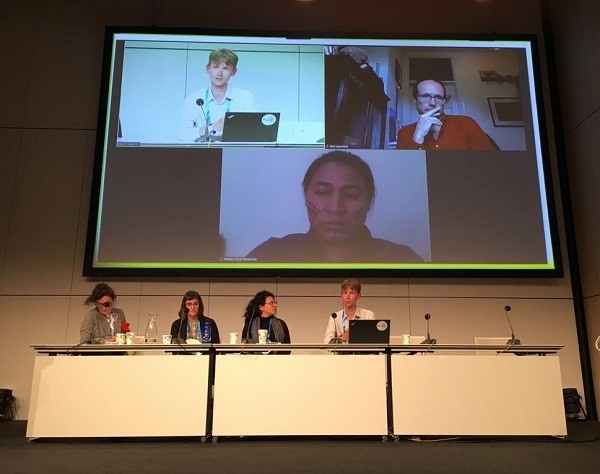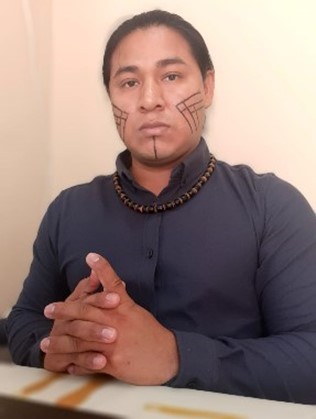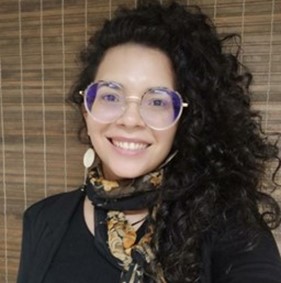Decolonising Science: the Chiquitano People meets Geoscientists in Vienna
The Chiquitano people “disembark” in Vienna
An event considered “Europe's eyes on Earth” took place in Vienna, Austria. It was attended by a representative of the Chiquitano Indigenous People.
By Loyuá Costa 13/06/2022

From May 23 to 28, in Vienna, Austria, the European Geosciences Union (EGU) took place, with Helen M. Glaves, Philippe Courtial and other members of the Executive Board. At the Symposium, the Chiquitano indigenous people were represented by Silvano Chue Muquissai, a Chiquitano indigenous Law student from the Federal University of Mato Grosso and Loyuá Ribeiro Fernandes Moreira da Costa, a popular lawyer at the Dom Máximo Biennès Human Rights Center. Based in Munich, Germany, the non-profit EGU was created in September 2002 as a merger of the European Geophysical Society (EGS) and the European Union of Geosciences (EUG). The EGU, considered “Europe's eyes on Earth”, encompasses a large body of research aimed at the planet and its environment, for the benefit of citizens. As reported by EGU representatives: “The European Geosciences Union (EGU) is the leading organisation for Earth, planetary and space science research in Europe. With our partner organisations worldwide, we foster fundamental geoscience research, alongside applied research that addresses key societal and environmental challenges. Our vision is to realize a sustainable and just future for humanity and for the planet.”
Annually, the results of studies and research by scientists from different parts of the world are shared during the General Assembly, considered the largest and most important event in Europe in the field of geosciences. This year, which for the first time took place in the hybrid modality, had “12,332 presentations in 791 sessions. 7,315 colleagues from 89 countries participated on site in Vienna, accompanied by 7,002 virtual participants from 116 countries.”
The session “Scientific Neo-Colonialism: what is it and why should you care?” was chaired by Giuliana Panieri, Bárbara Ervens, Claudia Jesus-Rydin and Anouk Beniestn and featured presentations by Robyn Pickering, Jamie Males, Riche Pancost, Loyuá Costa and Silvano Chue Muquissai.
Loyuá Costa started the presentation of the ECO_CARE project, coordinated by professors Giulia Parola (UNIRIO - the Federal University of the State of Rio de Janeiro) and Margherita Paola Poto (UiT – The Arctic University of Norway), about the relationship between the Chiquitano indigenous group and water, and the socio-environmental conflicts. Loyuá also explained the methodology adopted by the project members, in which researchers are the indigenous people themselves. On the occasion, she narrated the activities undertaken by the Mato Grosso State Human Rights Council and the Mato Grosso Human Rights Defenders Protection Program, when activated by the Chiquitano Council of Chiefs and Leaders, as well as the importance of networking. Loyuá explained how all these activities give visibility to situations of human rights violations.
Silvano Chue Muquissai presented information about his people, focusing on the Chiquitano's relationship with water.
“We Chiquitanos understand nature as a fundamental part of our existence. In Nature, there is everything we need to live. We believe that each part of it has its natural owners, the spirits of the forest or water, which can react to human actions fiercely if they are being threatened. Every place with water, for example, that does not dry up, has its owner. Therefore, we respect Nature as if it was our relative because we live from it and only it can provide everything we need to survive, but also with the fear of reactions to its misuse. Still, in this context, there are some who consider it as our mother, because everything done or taken from Nature is requested permission, and the use is done in moderation, only the essential to accomplish what you want. So care is based on preservation, conservation, with respect.”
After his presentation, the audience was interested to know what the Chiquitano indigenous people expect from non-indigenous people in relation to care for Nature and water. Muquissai replied:
“The biggest challenge for indigenous peoples, in general, and specifically for the Chiquitano people, is to have their territory demarcated because only with the territory demarcation we will be able to take care of Nature, because, currently, preserved forests and rivers are in indigenous territories that have been demarcated according to state law. for the traditional indigenous territories which are not demarcated, are very difficult to be cared for by the indigenous peoples. What we expect from non-indigenous people is to support indigenous peoples in Brazil in the search for recognition and demarcation of indigenous territories. With that, the benefits will be for everyone, also for the Planet.”
Loyuá Costa ended the roundtable discussion by pointing out the importance of spaces for dialogue on the new colonialism in research, internationally and in Brazil, congratulating the EGU for the initiative. She also said that research is never neutral or impartial about the Earth and the environment, so “we scientists have a social role to play”.

*Silvano Chue Muquissai
Graduating student in Law from Universidade Federal de Mato Grosso - UFMT.
- First President of the Local Council of Indigenous Health Usinhánorich Putisiórch (2013).
- Early Years Teacher at the Chiquitano José Turíbio Indigenous State School (2013).
- Deliberative Councilor of the Federation of Indigenous Peoples and Organizations of Mato Grosso - FEPOIMT (2017)
- Member of the State Council for the Promotion of Racial Equality - CEPIR (2017-2018) and of the State Committee of Traditional Peoples and Communities (2018).

**Loyuá Ribeiro Fernandes Moreira da Costa
- Master in Constitutional Law from Universidade Federal Fluminense - UFF.
- Lawyer for the Human Rights Defenders Protection Program and the Dom Máximo Biennès Human Rights Center.
- Secretary General of the Mato Grosso State Human Rights Council.
SOURCE: Silvano Chue Muquissai and Loyuá Ribeiro F. da Costa
http://circuitomt.com.br/editorias/cultura/170202-povo-chiquitano-em-viena.html